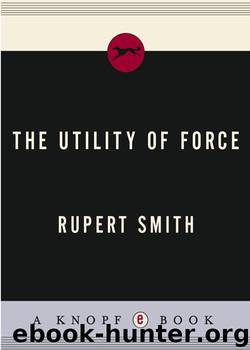The Utility of Force by Rupert Smith

Author:Rupert Smith
Language: eng
Format: epub
ISBN: 9780307267412
Publisher: Knopf Doubleday Publishing Group
Published: 2007-01-15T16:00:00+00:00
The Cold War confrontation also provided the overarching structure for another kind of conflict: those resulting from the postcolonial withdrawals from empire. One of the most important examples of this trend, which emerged upon the model of the antithesis and came to show all the early signs of war amongst the people, was the Malayan emergency. The 1941 Atlantic Charter signed by President Roosevelt and Prime Minister Churchill, that would become the basis of the UN Charter, signalled that Britain would eventually grant its colonies the right to self-determination. But in addition, Japanese victory over British forces in 1942 had destroyed the aura of invincibility surrounding western European forces, whilst in 1947 the British departure from India set a precedent for waning colonial powers and would-be sovereign states. However, whilst this was accomplished relatively peacefully—notwithstanding the division into Pakistan and the ensuing dispute and wars over Kashmir—other colonies held the seeds of confrontation and eventual conflict.
The Malayan Peoples’ Anti-Japanese Army (MPAJA) was formed as the military arm of the Malayan Communist Party (MCP) to resist the Japanese when they occupied Malaya. The majority of its members were of Chinese origin. The British had supported the MPAJA with weapons, training and advisors just as they did with other “resistance movements” in Axis-occupied territories. After the war, the MPAJA was treated as a heroic ally, and a delegation was invited to attend the victory parade in London. However, the marriage of convenience between the MCP and the British did not last: they no longer shared a common enemy or political purpose, and the British vision of an independent Federation of Malaya differed markedly from the MCP’s. The MPAJA was renamed the Malayan Peoples’ Anti-British Army (MPABA), but in a bid to attract support from different racial groups within the local population it was soon renamed yet again, to the Malayan Races Liberation Army (MRLA).
In June 1948 three British planters were murdered in Malaya. In a matter of months the “Malayan emergency” escalated, as guerrilla units of the MRLA attacked plantations and sabotaged infrastructure to drive the British out and to prevent the colony from functioning—all the while terrorizing the local population into supporting them. In response Britain declared a state of emergency, and Malayan and British troops set about tracking down the communist terrorists (dubbed CTs). However, responding to force with force was understood to be insufficient to win. MRLA guerrillas benefited from years of experience of operations against the Japanese, and they were also in possession of stocks of weaponry hoarded at the end of the Second World War by the Communist Party. Moreover, they could rely on the jungle terrain for cover and were supported by a segment of the population, which included a sizeable part of the Chinese minority, although overall the people of Malaya were ambivalent about the insurrection.
Whilst international media attention was focused upon the Korean War, the British, drawing on their experience which reached back to at least the Boer War, decided to focus on removing guerrilla sympathizers from the field.
Download
This site does not store any files on its server. We only index and link to content provided by other sites. Please contact the content providers to delete copyright contents if any and email us, we'll remove relevant links or contents immediately.
| Arms Control | Diplomacy |
| Security | Trades & Tariffs |
| Treaties | African |
| Asian | Australian & Oceanian |
| Canadian | Caribbean & Latin American |
| European | Middle Eastern |
| Russian & Former Soviet Union |
The Secret History by Donna Tartt(19067)
The Social Justice Warrior Handbook by Lisa De Pasquale(12190)
Thirteen Reasons Why by Jay Asher(8900)
This Is How You Lose Her by Junot Diaz(6881)
Weapons of Math Destruction by Cathy O'Neil(6270)
Zero to One by Peter Thiel(5793)
Beartown by Fredrik Backman(5748)
The Myth of the Strong Leader by Archie Brown(5505)
The Fire Next Time by James Baldwin(5435)
How Democracies Die by Steven Levitsky & Daniel Ziblatt(5217)
Promise Me, Dad by Joe Biden(5148)
Stone's Rules by Roger Stone(5085)
A Higher Loyalty: Truth, Lies, and Leadership by James Comey(4958)
100 Deadly Skills by Clint Emerson(4922)
Rise and Kill First by Ronen Bergman(4784)
Secrecy World by Jake Bernstein(4746)
The David Icke Guide to the Global Conspiracy (and how to end it) by David Icke(4712)
The Farm by Tom Rob Smith(4505)
The Doomsday Machine by Daniel Ellsberg(4489)
